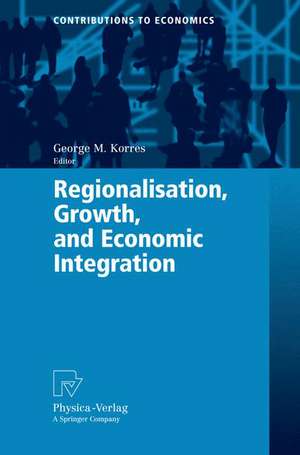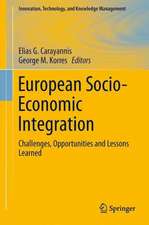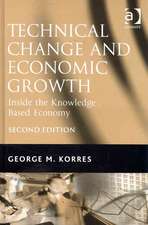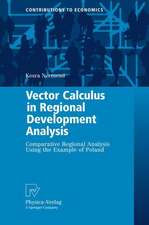Regionalisation, Growth, and Economic Integration: Contributions to Economics
Editat de George M. Korresen Limba Engleză Paperback – 27 aug 2007
Din seria Contributions to Economics
- 18%
 Preț: 1001.81 lei
Preț: 1001.81 lei -
 Preț: 90.83 lei
Preț: 90.83 lei - 15%
 Preț: 649.06 lei
Preț: 649.06 lei - 18%
 Preț: 1109.92 lei
Preț: 1109.92 lei - 24%
 Preț: 657.09 lei
Preț: 657.09 lei - 18%
 Preț: 976.54 lei
Preț: 976.54 lei - 17%
 Preț: 361.03 lei
Preț: 361.03 lei - 18%
 Preț: 1027.83 lei
Preț: 1027.83 lei -
 Preț: 283.93 lei
Preț: 283.93 lei - 15%
 Preț: 644.95 lei
Preț: 644.95 lei - 15%
 Preț: 638.24 lei
Preț: 638.24 lei -
 Preț: 394.29 lei
Preț: 394.29 lei - 15%
 Preț: 636.80 lei
Preț: 636.80 lei - 15%
 Preț: 637.78 lei
Preț: 637.78 lei - 18%
 Preț: 723.69 lei
Preț: 723.69 lei - 15%
 Preț: 635.47 lei
Preț: 635.47 lei - 15%
 Preț: 634.00 lei
Preț: 634.00 lei -
 Preț: 392.75 lei
Preț: 392.75 lei -
 Preț: 383.33 lei
Preț: 383.33 lei - 15%
 Preț: 637.28 lei
Preț: 637.28 lei - 15%
 Preț: 636.80 lei
Preț: 636.80 lei - 18%
 Preț: 950.96 lei
Preț: 950.96 lei - 15%
 Preț: 634.68 lei
Preț: 634.68 lei -
 Preț: 387.38 lei
Preț: 387.38 lei - 15%
 Preț: 647.27 lei
Preț: 647.27 lei - 15%
 Preț: 636.63 lei
Preț: 636.63 lei - 15%
 Preț: 639.73 lei
Preț: 639.73 lei -
 Preț: 385.62 lei
Preț: 385.62 lei - 15%
 Preț: 641.85 lei
Preț: 641.85 lei - 20%
 Preț: 649.60 lei
Preț: 649.60 lei - 15%
 Preț: 641.71 lei
Preț: 641.71 lei -
 Preț: 387.96 lei
Preț: 387.96 lei - 15%
 Preț: 645.47 lei
Preț: 645.47 lei -
 Preț: 385.08 lei
Preț: 385.08 lei - 15%
 Preț: 646.62 lei
Preț: 646.62 lei -
 Preț: 383.33 lei
Preț: 383.33 lei - 15%
 Preț: 638.43 lei
Preț: 638.43 lei -
 Preț: 381.21 lei
Preț: 381.21 lei - 15%
 Preț: 642.51 lei
Preț: 642.51 lei - 15%
 Preț: 637.78 lei
Preț: 637.78 lei - 15%
 Preț: 641.71 lei
Preț: 641.71 lei -
 Preț: 384.70 lei
Preț: 384.70 lei -
 Preț: 379.86 lei
Preț: 379.86 lei -
 Preț: 378.34 lei
Preț: 378.34 lei -
 Preț: 384.70 lei
Preț: 384.70 lei -
 Preț: 388.52 lei
Preț: 388.52 lei - 15%
 Preț: 641.71 lei
Preț: 641.71 lei -
 Preț: 381.00 lei
Preț: 381.00 lei - 15%
 Preț: 644.95 lei
Preț: 644.95 lei -
 Preț: 386.00 lei
Preț: 386.00 lei
Preț: 643.34 lei
Preț vechi: 756.86 lei
-15% Nou
Puncte Express: 965
Preț estimativ în valută:
123.12€ • 133.69$ • 103.42£
123.12€ • 133.69$ • 103.42£
Carte tipărită la comandă
Livrare economică 23 aprilie-07 mai
Preluare comenzi: 021 569.72.76
Specificații
ISBN-13: 9783790819243
ISBN-10: 3790819247
Pagini: 332
Ilustrații: XX, 308 p. 40 illus.
Dimensiuni: 155 x 235 x 19 mm
Greutate: 0.5 kg
Ediția:2007
Editura: Physica-Verlag HD
Colecția Physica
Seria Contributions to Economics
Locul publicării:Heidelberg, Germany
ISBN-10: 3790819247
Pagini: 332
Ilustrații: XX, 308 p. 40 illus.
Dimensiuni: 155 x 235 x 19 mm
Greutate: 0.5 kg
Ediția:2007
Editura: Physica-Verlag HD
Colecția Physica
Seria Contributions to Economics
Locul publicării:Heidelberg, Germany
Public țintă
ResearchCuprins
Macroeconomic Issues of Regional Growth and Economic Integration.- Economic Integration and Labour Markets: Ways Forward.- An Assessment of the Integration of Eastern European Economies in the European Union.- Looking at the Monetary Integration: Modeling Interest Rate Transmission Dynamics in Greece. Is There any Structural Break After EMU?.- How Harmful is International Tax Competition?.- Microeconomic Issues of Regional Growth and Economic Integration.- Foreign Direct Investment (FDI) and Exchange Rate Uncertainty in Imperfectly Competitive Industries.- Foreign Direct Investment: Explaining the Regional Location Determinants in South-Eastern European Countries.- Starting with the Local - a Knowledge-Based Approach to Economic Integration.- Policies and Institutions of Regional Integration.- Education, Research and Regional Economic Disparities in the European Union After 2004 Enlargement: Econometric Models and Policy Challenges.- European Regional Convergence: Some Evidence for the Role of Information Communication Technologies.- Regional Disparities and the Effects of Innovation Activities on Regional Integration.- Challenges and Prospects for an Integrated Europe.- Research and Technological Development Policy and Innovative Performance: The Greek Case Within the EU.- Financial Autonomy of Local Governments: Case Studies of Finland and Poland.- From Closed to Open Regionalism in Central America: a Preliminary Assessment of the Proposed Belize-Guatemala Free Trade Agreement.- Aspects of Regional Social Governance. Welfare Reform in the US Implications for a Global Policy Against Exclusion.
Textul de pe ultima copertă
The purpose of this book is to analyse the process of regionalisation and to plot its future development. Regionalisation is a common feature of the changing territorial organisation of European states today. Regionalisation alone, however, cannot produce any of the benefits we attribute to it without looking into the conditions in which it occurs. Therefore, this book tackles the following questions, bringing together theory and empirical applications: What are the main determinants and implications for regional policy? How does economic policy affect the growth and integration process? Why is innovation important for regional economic development? Why is the regional dimension important for the innovation promotion? What has been our policy response so far and what lesson did we learn from it? And finally, what are our action lines for the future?

























